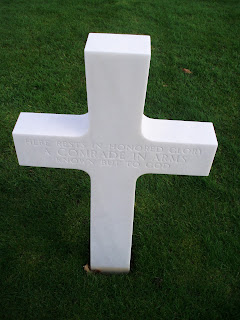
As February is Black History Month, I thought I'd feature some of the black heroes who have made our country what it is today. As I already did a post on
Martin Luther King, Jr., I won't be doing another...but there are so many more amazing people that need to be remembered. I can guarantee I won't get to all of them this month, but I'll see how many we can do. (I also expect I'll be doing posts on Lincoln and Washington this month in honor of their birthdays.)
Harriet Tubman was born Araminta Ross (Minty for short) in March of 1822. During her childhood, she was hired out to several masters who beat and abused her. At one point, she was sent to a local dry-goods store to get some supplies. There, she met a slave who had left his master without permission. The other slave's master asked young Minty to help him restrain the slave, and when she refused, the angry slaveowner threw a 2-pound weight at the fleeing slave. It missed the target and instead hit Minty in the head, breaking her skull. She was returned to her master, who let her rest without medical care for two days and then sent her back out into the fields to work, still bleeding. Her injury would haunt her for the rest of her life. She suffered from headaches and seizures as a result. She also had many visions and dreams that she believed were revelations from God (and I don't doubt it), and may also have been related to her injury.
As a slave, she held onto her faith in God and to biblical promises of freedom. In 1840, her father was freed, and when she consulted a white lawyer, it was discovered that her mother should also have been freed...but her family's masters had ignored that bit in a former master's will, and Minty couldn't afford to challenge it in court.
In about 1844, Araminta Ross married a free black man named John Tubman, and soon after their marriage, she changed her first name to Harriet. This complicated matters as a free man married a slave. The couple began praying for Harriet's master, first that God would change his heart and free her, and when that didn't seem to be happening, that God would take her master out. A week later, her master died, and she regretted her prayer. Her master's widow started work on selling off the slaves, and Harriet decided that "there was one of two things I had a right to, liberty or death; if I could not have one, I would have the other." On September 17, 1849, she escaped with her brothers Harry and Ben, but her brothers began to have second thoughts about escape, and they returned, bringing her along.
She later escaped by herself, using the
Underground Railroad. She traveled by night, using the North Star as her guide, and stayed with friendly people, many of them Quakers, who secretly helped many slaves to escape. She would later describe her arrival in Pennsylvania thus: "When I found I had crossed that line, I looked at my hands to see if I was the same person. There was such a glory over everything; the sun came like gold through the trees, and over the fields, and I felt like I was in Heaven."
Harriet spent the next while helping to free members of her family, going back and forth between Pennsylvania and Maryland. Her efforts earned her the nickname Moses by abolitionist William Lloyd Garrison. As the North became more and more dangerous to escaped slaves due to the
Fugitive Slave Act of 1850, she began helping fleeing slaves to go further north to Canada. She especially worked on this during the winter months, when the nights were longer.
She had an intense faith that God would protect her, and she had several close calls when passing former masters...but she was a quick thinker and managed to hide in plain sight (at one point pretending to read a newspaper - since she was known to be illiterate, her former master didn't figure that was her). She would often use spirituals as coded messages.
She later worked with abolitionist
John Brown, who called her General Tubman. Brown believed in a more violent method of freeing slaves, but they both had similar goals, and both looked to God for protection. Brown would later be caught and hanged for treason.
During the Civil War, Tubman urged President Lincoln to free the slaves in the South. Partway through the war, Lincoln issued the Emancipation Proclamation, which Tubman saw that as a step in the right direction. She even had a strategic part in guiding a troop of Yankee soldiers in an assault on Southern plantations. During the war, her aid to the Northern army helped to free hundreds of slaves - and many of the freed men joined the Union Army.
After the war, she married a Civil War veteran named Nelson Davis in 1869 (her first husband had been killed several years earlier), and they adopted a girl named Gertie.
Later in life, Tubman worked alongside
Susan B. Anthony and others in the fight for women's suffrage.
Around the turn of the century, she joined the
African Methodist Episcopal Zion Church, and in 1903 she donated a parcel of land to the church to found a home for elderly folks. The
Harriet Tubman Home for the Aged opened on June 23, 1908. Due to her childhood injury, she had to undergo brain surgery in the 1890s, and she became a patient in her own Home for the Aged in 1911. On March 10, 1913, she died of pneumonia, quoting her Savior Jesus to the people in the room: "I go to prepare a place for you." She was buried with full military honors.
---
Some quotes from Harriet Tubman:
"Every great dream begins with a dreamer. Always remember, you have within you the strength, the patience, and the passion to reach for the stars to change the world."
"I freed a thousand slaves. I could have freed a thousand more if only they knew they were slaves."
"I grew up like a neglected weed - ignorant of liberty, having no experience in it."
"I was the conductor of the Underground Railroad for eight years, and I can say what most conductors can't say; I never ran my train off the track and I never lost a passenger."
"I would fight for my liberty as long as my strength lasted, and if the time came for me to go, the Lord would let them take me."
"Lord, I'm going to hold steady onto You and You've got to see me through."












